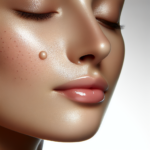Are you tired of dealing with skin issues like acne, sunburns, or dryness? Look no further, because we have the solution for you – apple cider vinegar! In this article, we will guide you on how to use apple cider vinegar to achieve healthier and more radiant skin. With its natural and antibacterial properties, this humble pantry staple can work wonders on your skin. Say goodbye to expensive skincare products and hello to a more affordable and effective solution, all with the help of apple cider vinegar. So let’s dive right in and discover the incredible benefits of apple cider vinegar for your skin.
Apple Cider Vinegar Benefits for Skin
Apple cider vinegar is a powerful ingredient that offers numerous benefits for your skin. Not only is it affordable and easily accessible, but it is also known for its natural properties that can enhance your skin’s health. Here are some of the key benefits of using apple cider vinegar for your skin:
Balances pH levels
One of the most significant benefits of apple cider vinegar for the skin is its ability to balance pH levels. Our skin naturally has a slightly acidic pH, which helps to maintain its protective barrier. However, factors such as harsh cleansers and environmental pollutants can disrupt this balance, leading to various skin issues. Apple cider vinegar can restore and maintain the optimal pH levels, preventing acne breakouts and promoting a healthy complexion.
Treats acne and pimples
If you struggle with acne and pimples, apple cider vinegar might be the solution you’ve been looking for. Its antibacterial and anti-inflammatory properties help combat the bacteria that cause acne, reduce redness, and soothe inflammation. Additionally, the acetic acid present in apple cider vinegar can unclog pores, regulate oil production, and prevent future breakouts.
Soothes sunburns
When excessive sun exposure leaves you with a painful sunburn, apple cider vinegar can come to the rescue. It possesses natural anti-inflammatory properties that can soothe sunburned skin and alleviate discomfort. Simply mix equal parts apple cider vinegar and water, and apply the solution to the affected areas with a soft cloth or cotton ball. This will provide relief and promote the healing process.
Reduces wrinkles and fine lines
As we age, our skin naturally develops wrinkles and fine lines. However, apple cider vinegar can help reduce the appearance of these signs of aging. Its acidic nature helps exfoliate the skin gently, promoting the removal of dead skin cells and revealing a smoother complexion. This exfoliating action can also stimulate collagen production, which improves skin elasticity and reduces the appearance of wrinkles and fine lines over time.
Exfoliates dead skin cells
Regular exfoliation is essential for maintaining healthy, radiant skin. Apple cider vinegar is a natural exfoliant that can effectively remove dead skin cells and unclog pores. By gently sloughing off these impurities, apple cider vinegar reveals a clearer, brighter complexion. You can use it as a toner or incorporate it into homemade face masks or scrubs for a gentle and natural exfoliation treatment.
Choosing the Right Apple Cider Vinegar
To fully reap the benefits of apple cider vinegar for your skin, it’s crucial to choose the right type of vinegar. Here are some key factors to consider when selecting apple cider vinegar for skincare:
Look for organic, unfiltered vinegar
When purchasing apple cider vinegar, opt for organic and unfiltered varieties. Organic vinegar means that the apples used in its production were grown without the use of synthetic fertilizers or pesticides. Unfiltered vinegar, on the other hand, contains a substance often referred to as “The Mother,” which is a combination of enzymes, probiotics, and proteins. The presence of “The Mother” indicates that the vinegar is less processed and retains more of its natural benefits.
Check for ‘The Mother’ content
To ensure that you’re getting the most beneficial apple cider vinegar, check the label for “The Mother” content. This cloudy substance settles at the bottom of the bottle and is responsible for many of the vinegar’s health properties. By choosing vinegar with a higher content of “The Mother,” you can maximize the potential benefits for your skin.
Avoid vinegar with additives or preservatives
When selecting apple cider vinegar for skincare, it’s important to avoid products that contain additives or preservatives. These additional ingredients can dilute the vinegar’s potency and may cause skin irritation. Read the labels carefully and choose vinegar with the fewest ingredients possible.
Apple Cider Vinegar Dilution Guide
While apple cider vinegar can work wonders for your skin, it must be diluted before use to prevent any potential adverse effects. Follow this simple dilution guide to ensure the safe and effective use of apple cider vinegar for your skin:
Always dilute vinegar with water
Never apply undiluted apple cider vinegar directly to your skin, as it is highly acidic and can cause irritation and burning. Instead, dilute it with water before use. This will help reduce the acidity and make it safe for topical application.
Recommended vinegar to water ratio
To dilute apple cider vinegar properly, mix one part vinegar with three parts water. This ratio provides a balanced and gentle solution for most skin types. However, if you have sensitive skin, you may want to use a higher water-to-vinegar ratio to further minimize the risk of irritation.
Perform a patch test before using on face
Before using apple cider vinegar on your face, it’s essential to perform a patch test. Apply a small amount of the diluted solution to a discreet area of your skin, such as the inside of your forearm. Wait 24 hours and check for any signs of irritation or allergic reactions. If you experience redness, itching, or discomfort, avoid using apple cider vinegar on your face.
Different Ways to Use Apple Cider Vinegar for Skin
Apple cider vinegar can be incorporated into your skincare routine in various ways. Here are some popular methods for using apple cider vinegar for healthier, more radiant skin:
Apple Cider Vinegar Toner
Using apple cider vinegar as a toner is a simple and effective way to reap its benefits. After cleansing your face, mix one part apple cider vinegar with three parts water, and apply the solution to your skin using a cotton ball or pad. Gently swipe the toner across your face, avoiding the delicate eye area. This will help restore the skin’s pH balance, tighten the pores, and leave your complexion refreshed.
Apple Cider Vinegar Face Mask
Applying an apple cider vinegar face mask can provide additional skincare benefits. Combine one tablespoon of apple cider vinegar with two tablespoons of raw honey or aloe vera gel. Mix well and apply the mask to your face, avoiding contact with your eyes. Leave it on for 10-15 minutes and then rinse off with warm water. This mask can help soothe inflammation, reduce redness, and promote a clearer complexion.
Apple Cider Vinegar Spot Treatment
For targeted treatment of acne or pimples, try using apple cider vinegar as a spot treatment. Dip a cotton swab into diluted apple cider vinegar and apply it directly to the affected areas. Leave it on for 15 minutes, then rinse off with cool water. This method can help to reduce inflammation, dry out blemishes, and speed up the healing process.
Apple Cider Vinegar Bath
For an all-over skin treatment, you can add apple cider vinegar to your bathwater. Fill your bathtub with warm water and add one to two cups of apple cider vinegar. Soak in the bath for 20-30 minutes, allowing your skin to absorb the vinegar’s beneficial properties. This can help soothe dry and itchy skin, reduce inflammation, and promote overall skin health.
Precautions and Potential Side Effects
While apple cider vinegar can provide numerous benefits for your skin, it’s important to use it with caution and be aware of potential side effects. Here are some precautions to consider when using apple cider vinegar for skincare:
Avoid using undiluted vinegar
Never apply undiluted apple cider vinegar to your skin, as it is too acidic and can cause irritation, burning, or chemical burns. Always dilute it with water before use to ensure its gentleness on the skin.
Discontinue use if experiencing irritation
If you experience any signs of irritation, such as redness, burning, or itching, discontinue using apple cider vinegar on your skin. These symptoms may indicate an allergic reaction or sensitivity to the vinegar.
Consult a dermatologist if unsure
If you have any concerns or questions about using apple cider vinegar for your skin, it’s always best to consult a dermatologist. They can provide personalized advice based on your specific skin type and address any potential risks or interactions with other skincare products.
Tips for Incorporating Apple Cider Vinegar into Your Skincare Routine
To make the most of apple cider vinegar’s benefits for your skin, consider the following tips when incorporating it into your skincare routine:
Start with small amounts
When beginning to use apple cider vinegar, start with small amounts to assess your skin’s reaction. Begin with a more diluted solution and gradually increase the vinegar content if your skin tolerates it well.
Gradually increase frequency of use
Once your skin has adapted to apple cider vinegar, you can gradually increase the frequency of use. Start with using it once or twice a week, and if your skin responds positively, you can gradually increase to three or four times a week.
Moisturize after using vinegar
Apple cider vinegar can be drying to the skin, so it’s important to follow up with a moisturizer after using it. Choose a hydrating moisturizer that suits your skin type to replenish moisture and maintain a healthy skin barrier.
Use sunscreen when going outside
Apple cider vinegar can make your skin more sensitive to the sun’s harmful UV rays. To protect your skin from sun damage, always apply a broad-spectrum sunscreen with at least SPF 30 before going outside, even on cloudy days.
DIY Apple Cider Vinegar Face Mask Recipes
Making your own apple cider vinegar face masks at home can be a fun and effective way to incorporate this ingredient into your skincare routine. Here are a few simple recipes to try:
Honey and Apple Cider Vinegar Mask
Mix two tablespoons of apple cider vinegar with one tablespoon of raw honey. Apply the mask to your face, avoiding the eye area, and leave it on for 15 minutes. Rinse off with warm water to reveal softer, more radiant skin.
Turmeric and Apple Cider Vinegar Mask
Combine one teaspoon of apple cider vinegar with half a teaspoon of turmeric powder and a tablespoon of yogurt. Mix well and apply the mask to your face. Leave it on for 10-15 minutes before rinsing off. This mask can help brighten the complexion and reduce inflammation.
Green Tea and Apple Cider Vinegar Mask
Brew a cup of green tea and let it cool completely. Mix one tablespoon of apple cider vinegar with two tablespoons of brewed green tea and one tablespoon of oatmeal. Apply the mask to your face and leave it on for 15-20 minutes. Rinse off with warm water to reveal smoother, more refreshed skin.
Using Apple Cider Vinegar for Specific Skin Concerns
In addition to its general skincare benefits, apple cider vinegar can also be beneficial for specific skin concerns. Here’s how it can be used for different skin issues:
Dark Spots and Hyperpigmentation
Apple cider vinegar’s exfoliating properties can help reduce dark spots and hyperpigmentation. Regular use can lighten these areas and even out your skin tone. Apply diluted apple cider vinegar to the affected areas using a cotton ball and leave it on for a few minutes before rinsing off. Be patient, as it may take time to see results.
Oily Skin and Large Pores
Apple cider vinegar can help regulate excess oil production and minimize the appearance of large pores. Its astringent properties can effectively remove impurities and tighten the skin. Use a diluted apple cider vinegar toner daily to maintain oil balance and reduce pore size.
Dry and Flaky Skin
If you have dry and flaky skin, apple cider vinegar can help restore moisture and improve the skin’s texture. Add a few tablespoons of apple cider vinegar to your bathwater and soak for 15-20 minutes. This will provide gentle exfoliation and help lock in moisture, leaving your skin soft and hydrated.
Sensitive Skin
While apple cider vinegar is generally safe for most skin types, those with sensitive skin should take extra precautions. Start with a highly diluted solution and perform a patch test before using it on your face. If you experience any adverse reactions, discontinue use and consult a dermatologist for alternative skincare options.
Other Uses of Apple Cider Vinegar for Skin
In addition to its benefits for facial skin, apple cider vinegar can also be used for various other skincare purposes. Here are a few alternative uses:
Hair Rinse
Apple cider vinegar can help remove product buildup and balance the pH of your scalp. After shampooing, mix one part apple cider vinegar with three parts water and pour it over your hair. Massage your scalp gently and leave the mixture on for a few minutes before rinsing out. This can leave your hair shinier, smoother, and free from residue.
Foot Soak
If you’re dealing with dry, rough, or smelly feet, apple cider vinegar can be a game-changer. Fill a basin with warm water and add one cup of apple cider vinegar. Soak your feet for 15-20 minutes, allowing the vinegar to soften calluses, eliminate odor-causing bacteria, and leave your feet feeling refreshed.
Nail Fungus Treatment
Apple cider vinegar has antifungal properties that can help combat nail fungus. Mix equal parts apple cider vinegar and water in a small bowl and soak your affected nails for 15-20 minutes daily. This can help kill the fungus and promote healthier-looking nails.
Conclusion
Incorporating apple cider vinegar into your skincare routine can provide a plethora of benefits for your skin. From balancing pH levels and treating acne to reducing wrinkles and exfoliating dead skin cells, apple cider vinegar is a versatile ingredient that can enhance your complexion’s health and appearance.
Remember to choose organic, unfiltered vinegar with “The Mother” content, dilute it properly, and perform a patch test before applying it to your face. Additionally, start with small amounts, gradually increase frequency, and always moisturize and use sunscreen after using apple cider vinegar.
Experiment with different methods, such as toners, face masks, spot treatments, and even baths, to find what works best for your skin. Whether you’re dealing with specific skin concerns or just looking to maintain a healthy complexion, apple cider vinegar is a natural and affordable solution that can transform your skincare routine.




